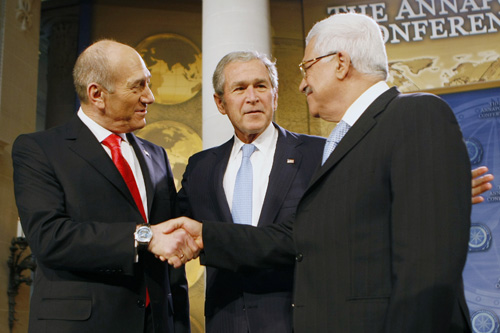Israelis, Palestinians agree to begin peace talks again

President Bush looks on as Israeli Prime Minister Ehud Olmert and Palestinian President Mahmoud Abbas shake hands at the first session of the Mideast conference at the U.S. Naval Academy in Annapolis, Md., Tuesday. Gerald Herbert, The Associated Press
Nov 28, 2007
Last updated on May 12, 2016 at 07:03 p.m.
ANNAPOLIS, Md. – Sealing their pledge with an awkward handshake, Israeli and Palestinian leaders resolved Tuesday to immediately restart moribund peace talks. President Bush said he will devote himself to ending the six-decade conflict in the 14 months he has left in office.
Israeli Prime Minister Ehud Olmert and Palestinian President Mahmoud Abbas, troubled leaders with fragile mandates for peace, told international backers and skeptical Arab neighbors that they are ready for hard bargaining toward an independent Palestinian homeland, a deal that has long eluded Mideast leaders and American presidents.
The launch of the first direct peace talks in nearly seven years was the centerpiece of a 44-nation conference Bush convened amid low expectations in this pretty, historic waterfront city east of Washington. Reading glasses on his nose, Bush opened the one-day session by reading the just-completed text of a joint agreement that had taken weeks of contentious negotiating but set only the vaguest terms for the talks to come.
“This is the beginning of the process, not the end of it,” Bush said.
Get The Daily Illini in your inbox!
The two sides understand that they need a deal, Bush said, and that they need one another.
“I pledge to devote my effort during my time as president to do all I can to help you achieve this ambitious goal,” Bush told Abbas and Olmert as the three stood together in the U.S. Naval Academy’s majestic Memorial Hall.
“I give you my personal commitment to support your work with the resources and resolve of the American government.”
Bush has held Mideast peacemaking at arms’ length for most of his nearly seven years in office, arguing that conditions in Israel and the Palestinian territories were not right for a more energetic role. Arab allies, among others, have warned that the Palestinian plight underlies other conflicts and feeds grievances across the Middle East, and have urged the White House to do more.
Bush seemed to be answering that criticism Tuesday, giving detailed reasons why that time is now. He said Israeli and Palestinian leaders are ready to make peace, there is a wider and unifying fight against extremism fed by the Palestinian conflict and the world understands the urgency of acting now.
Later, in an interview with The Associated Press, Bush spoke of the importance of giving beleaguered Palestinians something positive to look forward to – and he sketched a grim alternative.
Without a hopeful vision, he said, “it is conceivable that we could lose an entire generation – or a lot of a generation – to radicals and extremists.”
“There has to be something more positive. And that is on the horizon today,” the president said.
Negotiating teams will hold their first session in the region in just two weeks, on Dec. 12, and Olmert and Abbas plan to continue one-on-one discussions they began earlier this year. In addition, many of the same nations and organizations attending Tuesday’s conference will gather again on Dec. 17 in Paris to raise money for the perpetually cash-strapped Palestinians.
The bland language of the agreement released Tuesday reflected the difficulty of the task ahead. The document skirts the fundamental differences that have led to the collapse of all previous peace efforts: the borders of a Palestinian state, the status of disputed Jerusalem and the rights of Palestinian refugees and their descendants.
The agreement also commits the United States to be an arbiter of whether both sides are living up to promises unfulfilled in the past, such as corralling militants and freezing construction of Jewish settlements. Israel has resisted outside monitoring.
“I had many good reasons not to come here,” Olmert told diplomats, including those from Arab states that do not recognize Israel. “Memory of failures in the near and distant past weighs heavy upon us.”
Speaking in Hebrew, the Israeli leader decried “dreadful terrorism perpetrated by Palestinian” groups.
Abbas, speaking in Arabic, recited a familiar list of demands. These included calls for Israel to end the expansion of Jewish settlements on land that could be part of an eventual state called Palestine and to release some of the thousands of Palestinian prisoners in Israeli jails.
“Neither we nor you must beg for peace from the other,” Abbas said. “Peace and freedom is a right for us, just as peace and security is a right for you and us.”
For his part, Abbas made an impassioned appeal to Israelis to support the peace process, saying that war and terrorism “belong to the past.”
AP writers Amy Teibel, Mohammed Daraghmeh, Matthew Lee and Ben Feller contributed to this report





